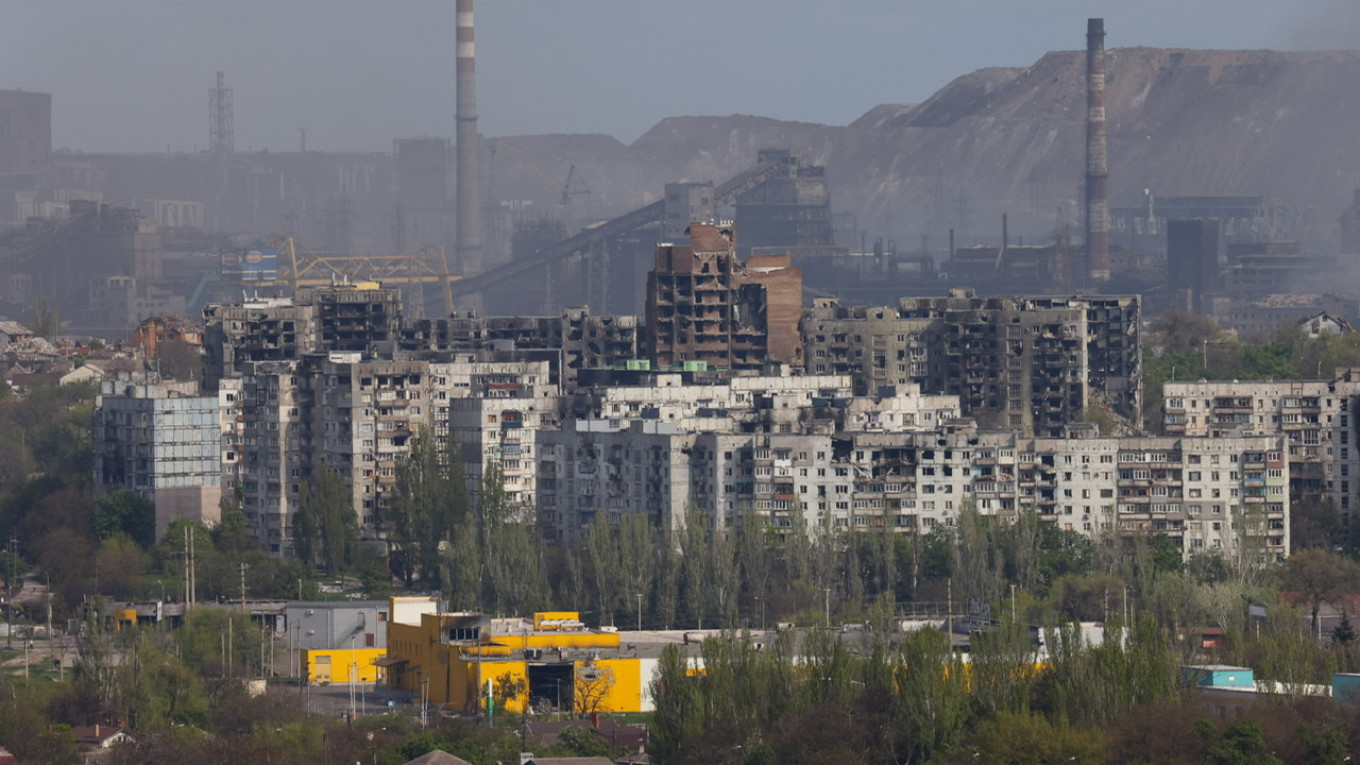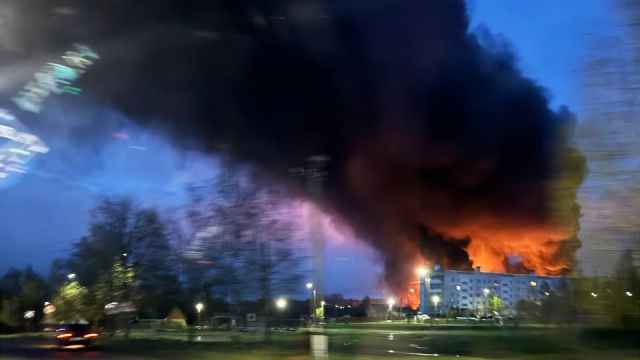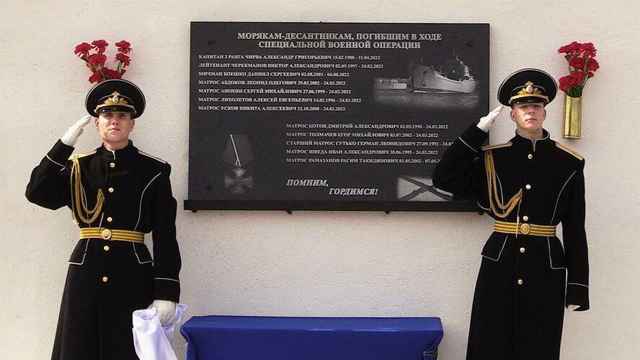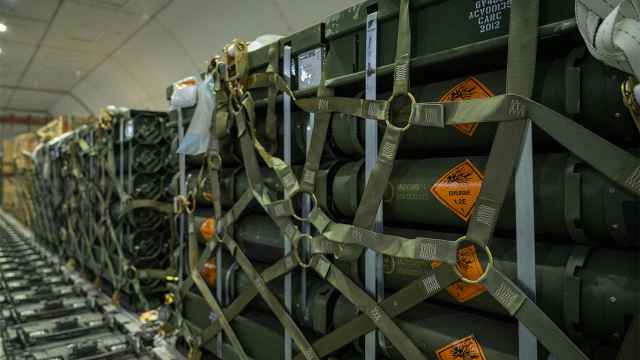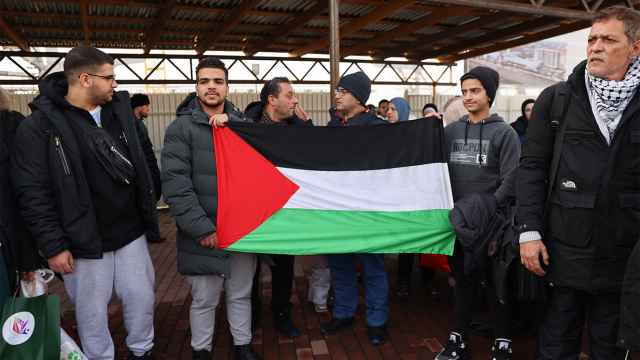Russian forces launched a major assault Tuesday on the Azovstal steel plant, the last holdout of Ukrainian forces in the devastated southern port city of Mariupol, as 101 civilians who had been trapped in the site for weeks were finally brought to safety.
"We are so thankful for everyone who helped us. There was a moment we lost hope, we thought everyone forgot about us," evacuee Anna Zaitseva told AFP after arriving in the Ukrainian-held city of Zaporizhzhia, her six-month-old baby in her arms.
The United Nations and Red Cross said 101 people were evacuated from the maze of Soviet-era tunnels underneath the sprawling Azovstal plant as part of a five-day operation.
"Without a doubt, we will continue doing everything we can to get all our people out of Mariupol, out of Azovstal," Ukrainian President Volodymyr Zelensky said in a video address.
"It's hard, but we need everyone, everyone who remains there — civilian and military.”
Another 58 people joined their convoy to Zaporizhzhia from the city of Mangush, outside Mariupol, said Osnat Lubrani, the UN's Humanitarian coordinator for Ukraine.
She warned there "may be more civilians who remain trapped" in Azovstal, saying the UN was ready to return to bring them to safety.
But Russian forces on Tuesday resumed attacks on the steel plant, where the Ukrainian fighters are making their last stand in Mariupol after almost constant bombardment since Moscow's invasion on Feb. 24.
It was one of a series of assaults Tuesday across Ukraine, where authorities said 21 civilians were killed in the eastern Donetsk region.
'We don't live, we survive'
Sviatoslav Palamar, deputy commander of Ukraine's Azov military unit, said Russia was assaulting the Azovstal plant with armored vehicles and tanks and was also attempting to bring "a large number" of infantry by boat.
Zelensky said that the Russians' latest strikes showed that they don't have "some kind of military goal."
"They cannot overpower Ukraine. But what is within their power still is to set fire to a children's amusement park... or to blow up a bridge or a grain storage," Zelensky said.
The Russian army confirmed its forces and pro-Moscow separatists were targeting Azovstal with artillery and planes, accusing Azov members and other Ukrainian troops of using a pause in fighting to take up combat positions.
The residents of Mariupol, a strategic port in southern Ukraine, have been living in desperate conditions without food, water and cut off from communications from the outside world.
The city is now largely calm, AFP journalists saw on a recent press tour organized by Russian forces, with the remaining locals emerging from hiding to a ruined city.
Daily life is dominated by the hunt for the most basic of essentials, they say.
"We don't live, we survive," said Irina, a 30-year-old video game designer, as she gathered food and water from an aid distribution point.
Ukraine's 'finest hour'
The war in Ukraine has killed thousands of people and displaced more than 13 million, creating the worst refugee crisis in Europe since World War II.
Western countries have backed Ukraine with cash and weapons while imposing unprecedented sanctions against Russia in a so far failed bid to make President Vladimir Putin pull back.
British Prime Minister Boris Johnson on Tuesday pledged another 300 million pounds ($376 million) in military aid, as he became the first foreign leader to address Ukraine's parliament since the conflict began.
Speaking via videolink, the premier evoked Britain's fight against the Nazis in World War II in hailing Kyiv's resistence as its "finest hour," and vowed to help ensure "no one will ever dare to attack you again."
The European Commission was meanwhile set Tuesday to put to member states a new package of measures, including a phased-out ban on Russian oil, officials said.
The package will also target Russia's largest bank, Sberbank, which will be excluded from the global banking communications system SWIFT.
Deadly factory strike
In the early weeks of the invasion, Russian forces encircled Ukraine's capital Kyiv but they have shifted to the east, including largely Russian-speaking areas, and the south.
In Donetsk, the regional governor said that 10 of the 21 dead Tuesday were killed in shelling of the Avdiivka coke plant, one of the largest in Europe.
In the town of Lyman, Ukrainian soldiers told AFP they have rigged with explosives a railway bridge over the Donets river and were waiting for orders to blow it up.
"It's never easy to destroy one of your own pieces of infrastructure. But between saving a bridge or protecting a city, there's no question at all," said one, going by the nom de guerre of "The Engineer."
Russia's defense ministry meanwhile said its forces had struck a logistics center at a military airfield in the region around the Black Sea port of Odessa, used for the delivery of foreign-made weapons.
Storage facilities containing Turkey's Bayraktar drones as well as missiles and ammunition from the United States and Europe have been destroyed, it said.
A rocket strike also knocked out power in part of Lviv, the western city near Poland that has turned into a haven due to its comparative calm, Mayor Andriy Sadovy said on Twitter.
Ukrainian prosecutors say they have pinpointed more than 8,000 war crimes carried out by Russian troops and are investigating 10 Russian soldiers for suspected atrocities in the town of Bucha, near Kyiv.
But in a phone call with French President Emmanuel Macron on Tuesday, Putin accused Ukrainian forces of committing war crimes and claimed the EU was "ignoring" them, according to the Kremlin.
The United States warned on Monday that Moscow was preparing imminently to annex the eastern regions of Luhansk and Donetsk, planning to "engineer referenda" to join Russia sometime in mid-May.
Pro-Russian separatists in the two regions declared independence in 2014, but Moscow has so far stopped short of formally incorporating them as it did that year with the Crimean peninsula.
A Message from The Moscow Times:
Dear readers,
We are facing unprecedented challenges. Russia's Prosecutor General's Office has designated The Moscow Times as an "undesirable" organization, criminalizing our work and putting our staff at risk of prosecution. This follows our earlier unjust labeling as a "foreign agent."
These actions are direct attempts to silence independent journalism in Russia. The authorities claim our work "discredits the decisions of the Russian leadership." We see things differently: we strive to provide accurate, unbiased reporting on Russia.
We, the journalists of The Moscow Times, refuse to be silenced. But to continue our work, we need your help.
Your support, no matter how small, makes a world of difference. If you can, please support us monthly starting from just $2. It's quick to set up, and every contribution makes a significant impact.
By supporting The Moscow Times, you're defending open, independent journalism in the face of repression. Thank you for standing with us.
Remind me later.


